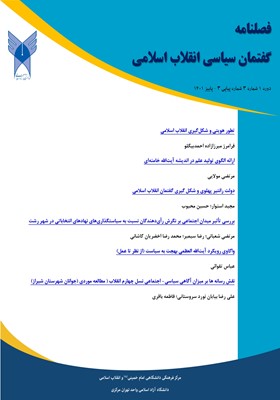تطور هویتی و شکلگیری انقلاب اسلامی
محورهای موضوعی : فلسفه سیاسی انقلاب اسلامیفرامرز میرزازاده احمدبیگلو 1 *
1 - گروه علوم سیاسی، واحد ایلام، دانشگاه آزاد اسلامی، ایلام، ایران
کلید واژه: "هویت دینی", "هویت روایی", "تداوم و تحول", "انقلاب اسلامی ",
چکیده مقاله :
علل و عوامل داخلی و بینالمللی متعددی برای تبیین و تحلیل شکلگیری انقلاب اسلامی ایران طرح شدهاند اما به مبنا و تطور هویت (دینی) ایرانی پرداخته نشده است. بنابراین، این تحقیق با هدف یافتن مبنای اصلی هویتی در شکلگیری انقلاب اسلامی، در صدد جستجوی محور اصلی شکلگیری انقلاب اسلامی ایران در چارچوب هویت تاریخی ایرانیان میباشد. این مقاله با طرح این فرضیه که تطور هویتی در ایران با بهرهگیری از عناصر و مفاهیم مدرن و تزریق محتوای اسلامی در آن توانست ذهنیت شکلگیری انقلاب اسلامی را آماده کند تلاش میکند تا به روش توصیفی – تحلیلی و با استفاده از نظریه هویت روایی پل ریکور فرضیه مذکور را تبیین نماید. یافتههای به دستآمده نشان میدهد که دین بهسان جریانی تاریخی و با افتوخیزهای گاهوبیگاه محور تطور هویتی در ایران بوده و در مقابل عناصر بیرونی و درونی هویتی، متناسب با محتوای دینی یا ضددینی آنها، واکنشهای مثبت و منفی از خود نشان داده است که پذیرش اسلام و شکلگیری انقلاب اسلامی از نقاط مثبت بارز و مقابله با حمله اسکندر، مغغولها و شکست مشروطیت از نتایج واکنشهای منفی هویت دینی در ایران میباشد. انقلاب اسلامی نیز در نتیجه هضم عناصر مدرنیته در درون کلانمفهوم بازگشت به خویشتن تجلی یافت که با مفاهیمی همچون، عقل، خودآگاهی، آزادی، برابری، رهایی، انقلاب و تغییر تعبیر و حمایت گردید. با اینوصف، نتیجه نهایی تحقیق این است که هویت دینی با هضم عناصر مدرن در خود از آنها برای شکلدهی انقلاب اسلامی استفاده کرده است.
Many domestic and international causes and factors have been proposed to explain and analyze the formation of the Iranian Islamic Revolution, but the basis and development of the Iranian (religious) identity has not been addressed. Therefore, with the aim of finding the main basis of identity in the formation of the Islamic Revolution, this research seeks to find the main axis of the formation of the Islamic Revolution of Iran in the framework of the historical identity of Iranians. This article proposes the hypothesis that "Identity development in Iran by using modern elements and concepts and injecting Islamic content into it was able to prepare the mentality of the formation of the Islamic Revolution. It tries to explain the mentioned hypothesis by descriptive-analytical method and using Paul Ricoeur's "narrative identity" theory. The obtained findings show that Behsan religion is a historical current and with occasional ups and downs, it is the center of identity development in Iran, and it has shown positive and negative reactions against the external and internal elements of identity, according to their religious or anti-religious content, that the acceptance of Islam and The formation of the Islamic revolution is one of the positive points and confronting the attack of Alexander, the Mongols and the failure of constitutionalism are the results of the negative reactions of religious identity in Iran. As a result of digesting the elements of modernity, the Islamic revolution was manifested in the concept of "returning to oneself" which was interpreted and supported by concepts such as reason, self-awareness, freedom, equality, liberation, revolution and change. With this description, the final result of the research is that the religious identity digested the modern elements and used them to shape the Islamic revolution.
_||_

